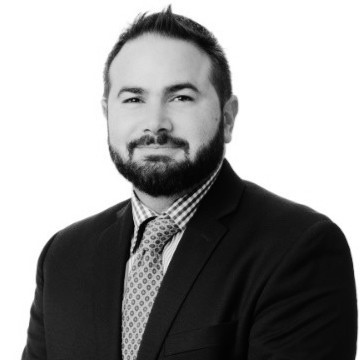The Power of Reflection: Jean-Philippe St Jacques
IMPM alumnus Jean-Philippe St Jacques never believed he’d build his career in the finance sector. “I never liked banking back then” he says. “Like many people that start out in the sector, I took up the job when I was young. I saw it as a summer job. I never thought I’d stay.”
Starting first as a cashier, as he moved forward, he began to understand the opportunities in front of him to grow a casual role into a fruitful career.
“At that point, I was with the Royal Bank of Canada (RBC), which had a global presence. With that came all the different departments for me to choose from, so I was able to grow my skills inside the enterprise.” From working as a cashier, Jean-Philippe was able to then try his hand in account management, take on a full commission sales role, and switch focus into mortgages “just to push myself,” he shares, “and see how good I was a salesman.”
This appetite for pushing his own boundaries is what has propelled Jean-Philippe through his career and, later, his education with the IMPM.
An Appetite For Management
At 24 Jean-Philippe took on a role with TD Bank, overseeing the opening of a new branch, which offered him his first taste of being a manager. This initial foray into coaching and developing people is where Jean-Philippe first experienced a real passion for his work.
“Coaching people and seeing them grow was more exciting to me than making sales. I used to make sales of close to $1M and that was great, but seeing and supporting my employees in doing it? That was actually a lot more rewarding.”
From there, Jean-Philippe worked for both TD Bank, and later RBC, managing people and branches across Quebec and beyond overseeing Insurance sales and strategy. Now as General Manager at Canadian Western Bank he manages the development of the Quebec region and its expansion… The scale of his work opened his eyes to the complexity of effective management; what works in one department might not be suitable for another, and the systems that suit teams in Quebec do not necessarily translate to the same teams in Vancouver.
Understanding that the responsibility he held as a manager was to be able to add value to his team, providing a positive influence rather than an overseeing eye, he opted to enhance his varied experiences by seeking a management education.

Finding The Right Fit
Jean-Philippe’s search on senior-level management programs offered in Canada gave him little variety.
“Typically, the options I kept finding were either the MBA, or EMBA. However, while I studied through university before Mintzberg’s “Managers not MBAs” book came out, I had read it – so I looked him up and that’s where I first read about the IMPM,” he shares.
Why did you enroll on the IMPM?
Mintzberg’s focus on practice management, experience and management perspective is what triggered my interest. And then, more and more, I looked at where participants were coming from and how that might build my management knowledge. Because, if we look at different perspectives – Canadian managers will, more or less, have the same thinking, so a class full of Canadian managers probably won’t challenge my mindset all that much.
What was interesting about the IMPM to me is that there were actually a lot more people in the class from elsewhere. I think in my class, I was one of only four from North America. We all assume that management is only done one way, the Western way. But there’s more ideas beyond our own. Everybody in the room was a long-time manager, which meant we could talk about the same universal problems but understand how different countries manage them in different ways.
The countries we studied in were not places I’d experienced before, or thought I’d be likely to, such was another huge appeal. Indian management perspectives and practices are so different from Canadian or British, but then so are those found in China or in Brazil… I assumed I’d be learning more on global management approaches of course, but I didn’t at first appreciate the value that local culture would have on my learning.
With IMPM you gain an immersive experience because there’s no one set culture, and because of what you are learning. You’re not just picking up what you’ve already got, and taking it to a new place, you’re landing there fresh and experiencing.
Looking back on the program now, after talking to a few of my classmates, we actually miss it! We miss being together in the classroom, brainstorming and having those no-boundaries discussions, exchanging views on various subjects. It was a highly rewarding experience; I miss having that daily engagement.

What are three key things you learned from the IMPM?
One has definitely been my own self-understanding and self-reflection. It’s aided me tremendously in my work, by being aware enough to say “okay, well, I thought this is the way we should do it, but actually it might not be.” So, understanding and respecting the cultures and the different thinking, and the different process of thinking as well have helped me assess my own decision making and approaches. Before IMPM I always thought I was open-minded. It turns out that, perhaps I wasn’t – or rather that I could be more so. I discovered I had a lot of biases, and that my industry had them too. Taking that time to reflect on these was so valuable in expanding my own understandings of my work, of others and of the world.
The second is how to communicate. Learning how to reflect – and taking time to reflect on the good as well as the bad (as managers we are problem solvers, so we are more inclined to seek out and solve the bad) has helped me through both personal and professional life challenges. There’s a lot of various techniques that can be used to chat about a problem or to bring a problem forward, and these are tools that we were taught on the program. Spending time each morning in a circle sharing our thoughts and perspectives each morning taught me how to open up effective dialogues and how to use the right one at the right time. I now use these skills on a daily basis.
The third, I’d say is understanding the impact I can have as a manager on various things within an organization, outside of my assigned duties. For example, on ethics. Depending on the words I use, or the way I talk, I can influence the behavior of those around me. This taps into reflection too – asking “what kind of environment am I creating within my workspace? What am I actually saying? And what am I actually evaluating the employees on?”
It’s quite a big thing for any manager to be able to take that step away from themselves and look back and say, “okay, well, what am I doing here? Is it the right way of doing things? You know, am I approaching things in the way that’s going to be most conducive to what I want to create?” The IMPM builds that awareness.

How did the IMPM affect your personal and/or professional life?
One particular example was COVID. Like most of us my life changed a lot during the pandemic. My work typically requires a lot of travel so to find myself and my family confined to our homes was a big shift.
The ability to reflect was something that made a significant impact on how I coped, and how I was able to support my family. I could ask myself “why am I feeling like this? What can I do to feel better, or to be more supportive?”. Trying to focus on the good things that occurred throughout the day and considering how to reproduce similar circumstances in future helped us all.
I think it helped me on the professional side too. As a sales guy I’m used to talking, so learning to truly listen – to sit back, not interrupt and take in what someone is saying, rather than waiting for my turn to talk, has become key in building effective relationships.

How did the IMPM contribute to your organization’s success?
I work for the biggest company in Canada, so the impact my IMPM experience can have on the full company might be, understandably, minimal. But I would say the impact on my employees and their daily lives, I’d say has been significant. Not only have I lowered my turnover, but employee feedback surveys have become a lot more positive. We’re delivering as a team much faster on projects, and with better-than-expected results. This is all a direct result of what my IMPM experience has enabled me to build with my team. Listening more, being aware of and challenging bias, setting the right culture and opening up the discussion to find new solutions. Outside the box thinking and solutioning.
In companies everyone kind of fits the same mold. You try and avoid it of course, but no matter how many diversity things you have in place, people tend to hire the people they recognize themselves in, or follow the protocols of those who came before. During the Brazil module we spent time considering if we were managers who took action, or of we were being acted upon? Because of the IMPM I now try to take action, one way I do this is by recruiting people whose insights and perspectives can challenge me, and challenge my colleagues, which keeps things diverse, and keeps me learning too.

What surprised you or impacted you the most about your IMPM experience?
The whole thing was a surprise! But really, what surprised me most was the end result. When you start doing the IMPM you don’t understand the process.
For example, at first the idea of reflecting on myself didn’t seem like the best use of in-class time or my investment! But then we established a pattern, and I conducted my first company visit and group project, and did the paperwork, and it all began to make sense. When you trust the process and lean into it, and then you look back on yourself at the end of it you can see how much you’ve changed. How much you’ve grown and how you can apply those skills to your life.
I was surprised how much of the program I could actually use the same day. Some management programs focus on theory and established case studies. They’re useful of course, but it’s just theory. How can it apply to my day-to-day life? How could this actually work in my workspace? Usually, you’d use 10% right? I probably use 75% of my IMPM learning, even now.

What would you say are the best parts of the IMPM that candidates should know about?
Sometimes when looking for a program you only see what’s good for your company – especially if they’re supporting you financially. It’s easy to forget that, on the personal side, your needs are just as important in the decision. You need to consider the return on your investment and that might not always be something tangible.
For me, the ROI was in personal growth. Looking at how I was when I started my journey versus how I ended it – personally, I changed a lot, and that’s not something you’ll see when you read rankings or other stats.
Any university could give you a qualification. What they can’t give you is a full complete personal growth plan that respects your limits whilst stretching them, encourages your beliefs but ensures you can value those of others. If there was going to be something that summed up why the IMPM is so different to anything else on the market. I think it’s that right there, isn’t it?
